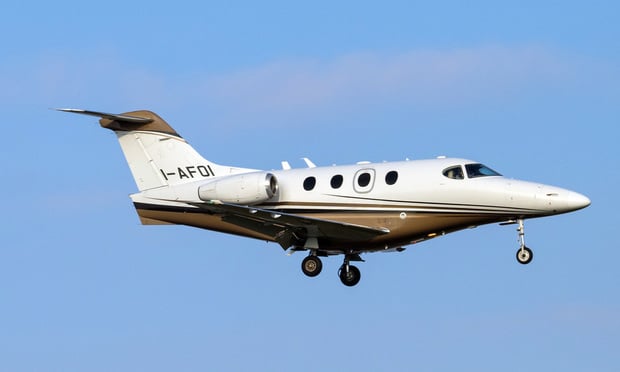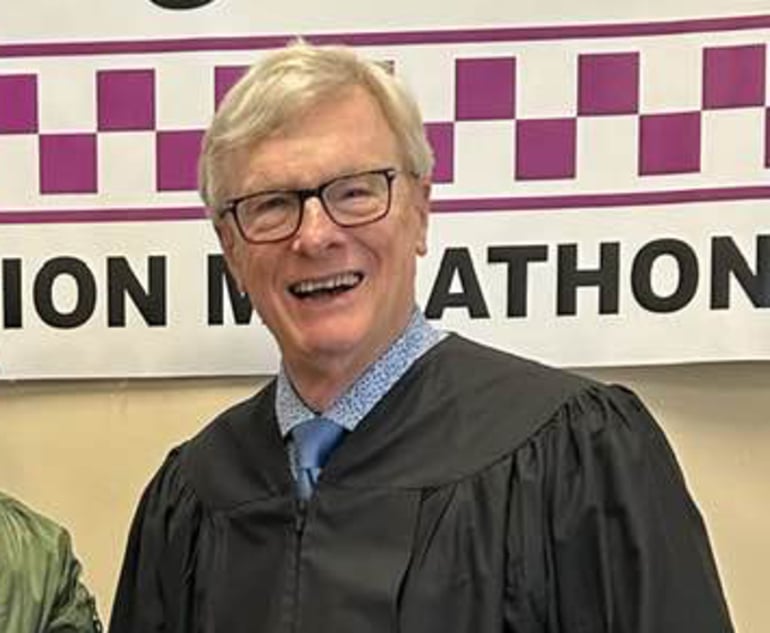First Trial Begins Over 2013 Plane Crash That Killed Five in Thomson
The only remaining defendant is Milliken & Co., whose property had the utility pole blamed in the crash.
August 07, 2018 at 07:39 PM
5 minute read
 Hawker Beechcraft Premier. Photo: flybyeigenheer/ Wikimedia.
Hawker Beechcraft Premier. Photo: flybyeigenheer/ Wikimedia.
Opening arguments began Tuesday in the first of five lawsuits to go to trial in the wake of an accident at the Thomson-McDuffie County Airport where five people died after an executive jet clipped a utility poll near the end of the runway.
The crash killed vascular surgeon Steven Roth, nurse anesthetist Lisa Volpitto, ultrasound technicians Heidi McCorkle and Tiffany Porter, and Kim Davidson, a secretary. All worked for The Vein Guys, a vascular practice with offices in Atlanta, Augusta and Nashville. The crash occurred as they returned from Nashville. The pilot and co-pilot of the Hawker Beechcraft jet were the only survivors.
The current trial involves claims by McCorkle's estate and two boys, ages 11 and 15.
The original suit named multiple defendants, including the Georgia Power Co., the company that owned the aircraft, the city and county, and the estate of Roth, whose practice owned the aircraft.
The only defendant left standing at trial was Milliken & Co., a global textile and chemical company based in South Carolina that owned a plant near the end of runway where a power pole was erected in 1989.
In arguments before Fulton County State Court Judge Jay Roth, that pole and an easement the company granted to the airport years earlier agreeing not to obstruct the airspace of planes landing or taking off are key to the plaintiffs' claims Milliken caused the crash that killed McCorkle, 28.
Moraitakis & Kushel partner Nicholas Moraitakis told the jury that the 1972 agreement stipulated that no “protruding obstructions” would be erected in the easement.
Milliken began planning an expansion of its Thomson plant in 1988, which included the construction of a new electrical substation, and new power poles and guy wires.
Engineers for Milliken and Georgia Power agreed that no obstructions taller than 50 feet would be erected in the easement, and a memo to that effect was written, Moraitakis said.
“Here's the interesting thing,” Moraitakis said. “There were no minutes, no followup, no confirmation … mum was the word.”
A form submitted to the Federal Aviation Administration showed the new structure in the easement, but failed to include the pole, which was 72 feet high, Moraitakis said.
On the night of the crash, Richard Trammell—a commercial pilot who was familiar with the airport—experienced a brake problem as he was landing and was attempting to pull back up for another attempt when he struck the unlighted power pole at about 58 feet above the ground, Moraitakis said.
Moraitakis is handling the case with firm colleague Martha Turner; William Stone and James Stone of the Stone Law Group; Joseph Brown of Mobile, Alabama's Cunningham Bounds; and John Clark of Macon's Clark & Smith.
Rising to defend Milliken, Pete DeMahy of Coral Gables' DeMahy, Labrador, Drake, Victor, Rojas & Cabeza noted the plaintiffs played the “blame game” with numerous other parties before the case finally got to trial.
“Now we're the only ones left,” he said.
DeMahy pointed out that Georgia Power erected the pole, and said the utility was and is the only entity authorized to alter it.
The pole is still in place today, the only difference is a “little flashing red light on top” added after the crash, he said.
DeMahy said there was never any agreement to a 50-foot limit in the easement, and that even if there were, “it wouldn't make any difference anyway.”
Expert testimony will indicate that the plane's wing first clipped a tree and a guy wire before hitting the pole, he said. The aircraft was only about 43 feet off the ground within seconds of the crash.
The evidence indicates that Trammell, who had only had about five hours' sleep in the previous 38 hours, miscalculated his approach speed and should have circled the airport instead of trying another tactic when it became clear he was in trouble, DeMahy said.
The pole had been there for 24 years with no one complaining, DeMahy said.
“Did the pole get built? Yes, Georgia Power built it. Did we sign the agreement? Yes, we did,” said DeMahy, representing Milliken with firm partner Orlando Cabeza, along with Stevan Miller and Lisa Richardson of Drew Eckl & Farnham, and Laurie Webb Daniel of Holland & Knight.
Conceding that the crash was a horrible tragedy for McCorkle and her family, DeMahey said, “I can't compete with sympathy because I have it myself. But I can compete with facts and I can compete with evidence.”
The trial is expected to last about two weeks.
This content has been archived. It is available through our partners, LexisNexis® and Bloomberg Law.
To view this content, please continue to their sites.
Not a Lexis Subscriber?
Subscribe Now
Not a Bloomberg Law Subscriber?
Subscribe Now
NOT FOR REPRINT
© 2025 ALM Global, LLC, All Rights Reserved. Request academic re-use from www.copyright.com. All other uses, submit a request to [email protected]. For more information visit Asset & Logo Licensing.
You Might Like
View All
Carrier Legal Chief Departs for GC Post at Defense Giant Lockheed Martin

Trending Stories
- 1Uber Files RICO Suit Against Plaintiff-Side Firms Alleging Fraudulent Injury Claims
- 2The Law Firm Disrupted: Scrutinizing the Elephant More Than the Mouse
- 3Inherent Diminished Value Damages Unavailable to 3rd-Party Claimants, Court Says
- 4Pa. Defense Firm Sued by Client Over Ex-Eagles Player's $43.5M Med Mal Win
- 5Losses Mount at Morris Manning, but Departing Ex-Chair Stays Bullish About His Old Firm's Future
Who Got The Work
J. Brugh Lower of Gibbons has entered an appearance for industrial equipment supplier Devco Corporation in a pending trademark infringement lawsuit. The suit, accusing the defendant of selling knock-off Graco products, was filed Dec. 18 in New Jersey District Court by Rivkin Radler on behalf of Graco Inc. and Graco Minnesota. The case, assigned to U.S. District Judge Zahid N. Quraishi, is 3:24-cv-11294, Graco Inc. et al v. Devco Corporation.
Who Got The Work
Rebecca Maller-Stein and Kent A. Yalowitz of Arnold & Porter Kaye Scholer have entered their appearances for Hanaco Venture Capital and its executives, Lior Prosor and David Frankel, in a pending securities lawsuit. The action, filed on Dec. 24 in New York Southern District Court by Zell, Aron & Co. on behalf of Goldeneye Advisors, accuses the defendants of negligently and fraudulently managing the plaintiff's $1 million investment. The case, assigned to U.S. District Judge Vernon S. Broderick, is 1:24-cv-09918, Goldeneye Advisors, LLC v. Hanaco Venture Capital, Ltd. et al.
Who Got The Work
Attorneys from A&O Shearman has stepped in as defense counsel for Toronto-Dominion Bank and other defendants in a pending securities class action. The suit, filed Dec. 11 in New York Southern District Court by Bleichmar Fonti & Auld, accuses the defendants of concealing the bank's 'pervasive' deficiencies in regards to its compliance with the Bank Secrecy Act and the quality of its anti-money laundering controls. The case, assigned to U.S. District Judge Arun Subramanian, is 1:24-cv-09445, Gonzalez v. The Toronto-Dominion Bank et al.
Who Got The Work
Crown Castle International, a Pennsylvania company providing shared communications infrastructure, has turned to Luke D. Wolf of Gordon Rees Scully Mansukhani to fend off a pending breach-of-contract lawsuit. The court action, filed Nov. 25 in Michigan Eastern District Court by Hooper Hathaway PC on behalf of The Town Residences LLC, accuses Crown Castle of failing to transfer approximately $30,000 in utility payments from T-Mobile in breach of a roof-top lease and assignment agreement. The case, assigned to U.S. District Judge Susan K. Declercq, is 2:24-cv-13131, The Town Residences LLC v. T-Mobile US, Inc. et al.
Who Got The Work
Wilfred P. Coronato and Daniel M. Schwartz of McCarter & English have stepped in as defense counsel to Electrolux Home Products Inc. in a pending product liability lawsuit. The court action, filed Nov. 26 in New York Eastern District Court by Poulos Lopiccolo PC and Nagel Rice LLP on behalf of David Stern, alleges that the defendant's refrigerators’ drawers and shelving repeatedly break and fall apart within months after purchase. The case, assigned to U.S. District Judge Joan M. Azrack, is 2:24-cv-08204, Stern v. Electrolux Home Products, Inc.
Featured Firms
Law Offices of Gary Martin Hays & Associates, P.C.
(470) 294-1674
Law Offices of Mark E. Salomone
(857) 444-6468
Smith & Hassler
(713) 739-1250








